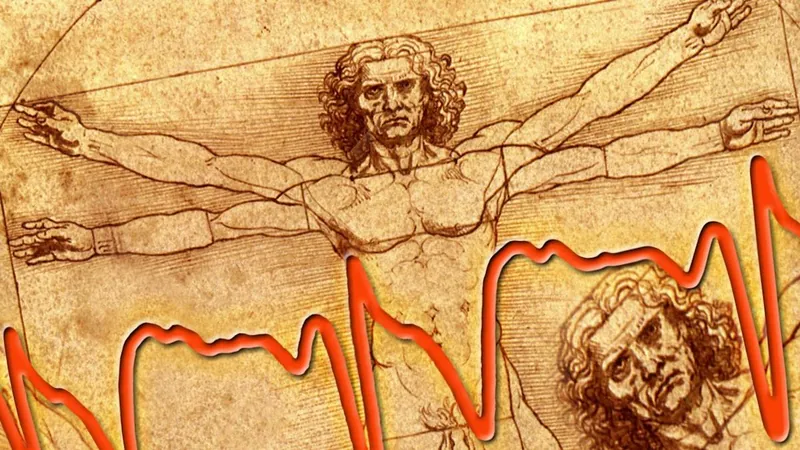
7 Alarming Signs Your Loved One Might Be Struggling with 'Bigorexia'
2025-06-24
Author: Ling
When we think of eating disorders, our minds often drift to young women grappling with body image issues. While this is certainly a prevalent narrative, there's a less-discussed reality: young men are also deeply affected by body image disorders, and it's high time we recognize it.
Dr. Jason Nagata from the University of California, San Francisco, emphasizes that eating disorders in boys are frequently overlooked and underdiagnosed. "Many people, including healthcare professionals, don't realize that eating disorders can occur in boys," he states, noting that much of the existing research is predominantly female-focused.
What Is Bigorexia?
Bigorexia, also known as muscle dysmorphia or reverse anorexia, is a condition where individuals become obsessed with attaining a muscular physique. Dr. Nagata explains that those affected often perceive themselves as small or weak, even when they are objectively fit. Approximately 90% of bigorexia cases occur in young men, typically aged 15 to 32.
Even though a muscular appearance is generally celebrated, the underlying issues linked with bigorexia can be just as harmful as traditional eating disorders.
7 Signs of Bigorexia You Should Never Ignore
If you're concerned about a loved one, here are some critical warning signs of bigorexia to watch for:
1. Compulsive Exercising
While exercise is a crucial part of a healthy lifestyle, those dealing with bigorexia often take it to extreme levels. They might spend hours at the gym, sacrificing other responsibilities and relationships in pursuit of their perfect physique.
2. Withdrawal from Enjoyable Activities
Bigorexia can disrupt one's quality of life. Affected individuals may withdraw from friends and family, missing out on enjoyable experiences due to their overwhelming exercise and dietary commitments.
3. Upset at Any Dietary Deviations
Those with bigorexia are typically obsessed with rigid diets. Any suggestion to deviate from their strict meal plans often results in anger or distress. They might count calories obsessively and resist foods that don't align with their muscle-building goals.
4. Inadequate Nutrition
If someone is exercising excessively without eating enough, they could be facing serious health risks. Insufficient caloric intake, even if it appears regular, may lead to malnutrition.
5. Excessive Supplement Use
Many individuals with bigorexia resort to an array of supplements and protein powders, often without understanding the potential risks involved. These products are frequently unregulated, posing further health concerns.
6. Use of Anabolic Steroids
The reliance on anabolic steroids—synthetic substances that mimic testosterone—is a major red flag. Their use can lead to dangerous physical and psychological effects, including aggression and severe health issues.
7. Obsessive Mirror Checking
Like some with traditional eating disorders, those with bigorexia frequently examine their reflections obsessively. This behavior can create an unhealthy fixation on their appearance.
Pressure from social media plays a significant role in rising instances of bigorexia. Unlike previous generations, today's youth constantly compare themselves to curated images of celebrities and influencers, which can warp their body image perceptions.
What to Do if You Suspect Bigorexia
If you notice any of these signs in a loved one, it's vital to approach the subject with care. Bigorexia is a serious mental health situation that can have severe repercussions. Seeking professional help from healthcare providers well-versed in eating disorders is crucial. An interdisciplinary approach—including mental health, medical, and nutrition specialists—might be the best pathway to recovery.





 Brasil (PT)
Brasil (PT)
 Canada (EN)
Canada (EN)
 Chile (ES)
Chile (ES)
 Česko (CS)
Česko (CS)
 대한민국 (KO)
대한민국 (KO)
 España (ES)
España (ES)
 France (FR)
France (FR)
 Hong Kong (EN)
Hong Kong (EN)
 Italia (IT)
Italia (IT)
 日本 (JA)
日本 (JA)
 Magyarország (HU)
Magyarország (HU)
 Norge (NO)
Norge (NO)
 Polska (PL)
Polska (PL)
 Schweiz (DE)
Schweiz (DE)
 Singapore (EN)
Singapore (EN)
 Sverige (SV)
Sverige (SV)
 Suomi (FI)
Suomi (FI)
 Türkiye (TR)
Türkiye (TR)
 الإمارات العربية المتحدة (AR)
الإمارات العربية المتحدة (AR)